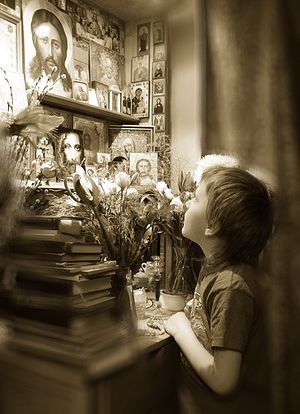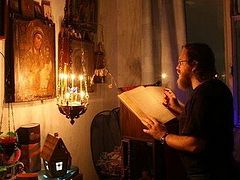With most of us at home due to the coronavirus epidemic, these notes on reading Holy Saturday liturgical texts at home with our children could prove very useful to families.
I will try to share with readers how reading the services at home can be organized in reality in an ordinary family, with ordinary children who are unable to perform hours-long vigils. Real praying at home, reading and singing from church services, though in a simple and considerably shortened form.
Is praying at home an extra load?
 It is very important to make a Church feast, particularly Pascha, a tangible, visual and tasty occasion for children, with bright and good memories for the rest of their long lives. The highest priority for Holy and Great Week is the participation in services, and not cooking delicious festal food, tidying up or decorating homes. Every day the services are special and they are only celebrated once a year. And we have a great desire to attend all of them.
It is very important to make a Church feast, particularly Pascha, a tangible, visual and tasty occasion for children, with bright and good memories for the rest of their long lives. The highest priority for Holy and Great Week is the participation in services, and not cooking delicious festal food, tidying up or decorating homes. Every day the services are special and they are only celebrated once a year. And we have a great desire to attend all of them.
To make such participation in services possible, it would be best to plan your daily chores thoroughly, do all you can do in advance, leaving minimum work for Holy Week. Every family extricates from this situation in a different way. Nevertheless, with babies, children who go to school, not least a high school with its never-ending tests and exams, you are unlikely to manage to attend all the services of Holy Week. If a pregnant or nursing mom is exhausted and hasn’t gotten enough sleep, it is vital for her to take a rest and get her sleep. Thus, in practice we have to choose when we go to church and when we stay at home. But keeping indoors doesn’t mean neglecting services.
It is quite realistic to participate in Church life if only to some extent, without reducing these special days and hours of the Church year to everyday routine and chores. That is possible when a mom is pregnant, when her children are small, and even when there are many of them. In my opinion, praying at home a little and reading something from Church services means helping mom rather than “creating an extra workload.” It is really hard to prepare for Pascha physically when you work like a horse. But making a pause and returning to the main purpose of this preparation with the help of the services will allow you to regain energy and remember clearly what and Who you are doing all of this for. Put aside kulichi, eggs and your unwashed fridge for a moment (ideally, you should have washed it during the sixth week of Great Lent). Recall that today our Savior is going towards Golgotha, suffering for us; He will be taken down from the Cross and laid in the tomb… It is so easy to forget these things in the fuss of household chores. And it is so easy to fill your home with irritation and even verbal lashings while preparing for the feast and trying to bring Paschal joy to your little ones…
The worst situation is when your mother has organized everything perfectly, the table is laid, we have stood through all the services according to the Typicon and have read all the necessary prayers… But all of this has been done with all bitterness, and wrath, and anger, and clamour, and evil speaking…, all malice—things that should be put away from you, your children and your homes, if you are Christians (Eph. 4:31). In such situations, reading the services at home can set us on the right track.
The blessed Saturday
Saturday is blessed. For it is already a festive occasion. The day of rest. The day of waiting for the Resurrection. The day of our Savior’s Descent into Hades—the abolition of death and the destruction of hell.
In Russia the Vespers is usually held in the morning. At the Vespers of Holy and Great Saturday fifteen paremias are read in front of the Holy Shroud in church; these are extracts from the Old Testament containing the prophecies about the Passion, death, and the Resurrection of Christ, the coming of the Lord’s everlasting Kingdom and the glory of the Church of the New Testament. And if we don’t go to church with our children, we can read something from the Holy Saturday services at home. Our family usually reads the paremias and a number of hymns of this day.
It is not so hard to organize praying at home by reading the paremias. After waking up in the morning we light candles and stand up to pray together.
We tell our children that reading the services at home is scheduled beforehand. And they are ready for it and wait for this special event. We dress a little festively. We open the text of the Vespers of Holy and Great Saturday in our books or on a tablet PC. We don’t read everything, for I know that my children (and not only small ones) won’t be able to listen to the entire service attentively.
First we read the opening prayers that are familiar to us, and then some stichera that recount the events of the day. We can tell the children who read well and easily (aged from eight up) to read stichera in turn.
The text of the services is accessible and like poetry. If you doubt that everything is clear to your children and if it is appropriate, while reading stichera parents clarify some words. But now we are not teaching—we are praying. Thus, now first and foremost try to be focused on prayer.
Today hell groans and cries aloud: “It had been better for me, had I not accepted Mary’s Son, for He has come to me and destroyed my power; he has shattered the gates of brass, and as god He had raised up the souls that once I held. Glory to Thy Cross, O Lord, and to Thy Resurrection.
You should pronounce the words distinctly and audibly.
Today hell groans and cries aloud: My power has been destroyed. I accepted a mortal man as one of the dead; yet I cannot keep Him prisoner, and with Him I shall lose all those over whom I ruled. I held in my power the dead from all the ages; be see, He is raising the all.” Glory to Thy Cross, O Lord, and to Thy Resurrection.
Today hell groans and cries aloud: “My dominion has been swallowed up; the Shepherd has been crucified and He has raised Adam. I am deprived of those whom once I ruled; in my strength I devoured them, but now I have cast them forth. He who was crucified has emptied the tombs; the power of death has no more strength.” .” Glory to Thy Cross, O Lord, and to Thy Resurrection.
Glory to the Father, and to the Son, and to the Holy Spirit (you can ask the child who usually reads these words during joint prayer to read them now).
Moses the great mystically prefigured this present day, saying: “And God blessed the seventh day.” For this is the blessed Sabath, this is the day of rest, on which the only begotten Son of God rested from all His works. Suffering death in accordance with the plan of salvation, he kept the Sabbath in the flesh; and returning once again to what He was, through His Resurrection He has granted us eternal life, for He alone is good and loves mankind.
Then we proceed to reading the paremias. All of them can be found in the service books and on major Orthodox websites. If we read the Holy Scriptures with children during the year and during our lives, all the images and stories will be known to them here.
We start praying in the standing position and usually read paremias while sitting. The children don’t get tired this way and reading doesn’t become a heavy load.
Sometimes we read short commentaries to these Old Testament extracts—it is convenient to do so using a selection on the internet. Children aged six to eight grasp this easily and with interest.
In church, after reading the sixth paremia on the Jews’ miraculous crossing of the Red Sea, the Song of Moses is sung with the Royal Doors opened: “Let us sing unto the Lord, for He hast been gloriously glorified.” The chorus repeats the refrain many times: “For He hast been gloriously glorified”, and the reader repeats the whole song verse by verse. While praying at home, we can also swap roles at this point. If we were sitting, we now stand up; the father or one of the oldest children reads the verse (optionally), while we sing the refrain in unison; then we sit down and continue reading the Old Testament.
We should take into consideration that reading all the paremias with small children (and even with teenagers) can be difficult. It depends on the specific children, to whom we should be attentive. We can easily notice that children are tired and can’t understand the reading anymore. In such cases we read only the first three or four paremias (optionally) and then: “Let us sing unto the Lord.” After that we can read three or four more paremias.
Next we stand up again and read more verses of the day and repeat the refrain together again. This time it is as follows: “Arise, O God, and judge Thou the earth, for Thou shalt have an inheritance in all the nations.” On the whole, these are very solemn, understandable and vivid verses:
Reader: Praise the Lord and exalt Him above all forever.
Chorus: Praise the Lord and exalt Him above all forever.
Reader: O all ye works of the Lord, bless ye the Lord.
Chorus: Praise the Lord and exalt Him above all forever.
Reader: O ye angels of the Lord, bless ye the Lord.
Chorus: Praise the Lord and exalt Him above all forever.
Reader: Bless Him ye heavens.
Chorus: Praise the Lord and exalt Him above all forever.
The Old Testament poetry, perfectly understandable for children requires no interpretation:
Reader: Bless Him O ye sun and moon.
Chorus: Praise the Lord and exalt Him above all forever.
Reader: Bless Him O ye stars of the heavens.
Chorus: Praise the Lord and exalt Him above all forever.
Reader: Bless Him all ye rains and dew.
Chorus: Praise the Lord and exalt Him above all forever.
Reader: Bless Him all ye winds.
Chorus: Praise the Lord and exalt Him above all forever.
Further: Bless Him Ye mountains and hills, rivers and streams, and even whales and all that moves in the seas, fruitful trees and winged birds, beasts and all cattle.
And, finally:
Reader: We praise, we bless, we worship the Lord
Chorus: Singing and exalting Him unto all ages.
After these Lenten verses we remove the black lace from our icons and hang up white and red veils instead. For at this time priests in churches take off their black and violet vestments and change into Paschal robes. The feast is coming! It is coming to the world right now, so tangibly, so visibly, and so clearly both in church and to our children at home.
After this final active break we conclude by reading the Gospel (Mt. 28:1-20). Our children have already heard this story, so they will easily understand the text and recognize the episode.
The paremias are themed, in other words, they are interesting and can be grasped by children just like any story.
We read them in the language well understandable for children; they are sitting, reading alternately with singing, and this means that children grasp the meaning of what they read in the services at home and participate in them actively. Our children have gotten used to our unique praying at home and are quite ready to understand it. Now we sit, now we stand up: This simple thing—a change of position—prevents us from getting tired and slackening in attention. We read together, follow the service with a book, read in an articulate manner, and therefore, everything is more or less clear and not hard. And outward things help us too—an icon lamp and candles are burning in front of the icons.
Both the change of veils on the icons and the long-expected change “from Great Lent to Pascha” have a dramatic emotional effect; it is the guarantee of attention and a jovial mood of this whole spectacle. And all of this is prayer. This is all for God and about God; this is all about the miracle of our life occurring this day.
Is it possible to go too far with praying at home?
Of course, each family organizes praying at home in its own way. And it should be so. The simplified option I have suggested is just an option that has “taken root” in our home.
This option is by no means universal. Someone will argue: “This is utter profanation. You have shortened everything. Reading the Bible (even if it’s the Old Testament) while sitting is no good at all. Everybody must go to church and stand through all the services in these days…” Well, he who can read the entire service does it without me; and he who takes children to all church services does well. But, unfortunately, I can’t manage this.
Others will argue that this is all too difficult and too complicated; it is a fashion to say, “that means overfeeding children with Orthodoxy” and turning them off from the faith.
However strange associating prayer and Church services with negative things may sound, children can easily be oppressed by “prayer vigils” at home or in church. For example, when you scold or even beat your child for the untidy room before prayer. No matter whether it is a beating or just a clip on the back of his head. Then “prayer” will be associated with something that “hurts me”, “I am told off”, “I am not loved”—a “prayer” through which a child will feel resentment towards his parents, or younger brothers or sisters, because of whom he has been punished. Or when you pull up or shout at children during “prayer” for “not standing straight”, “looking in the wrong direction”, “squatting”, and so on. Or when someone monotonously mutters under his breath instead of reading through the service (even if a shortened one) to prevent the others from hearing or understanding and bore those who have stood to pray with joy.
Or when you arrange a two-hour vigil for small children and force them to stand erect and motionless, which is against their physiological and psychological development. Or when you organize praying at home without warning the children beforehand, and they (grown-up enough) have already planned something interesting and meaningful for themselves.
Or when you start organizing praying at home as a special phenomenon in a family where the children are already teenagers who have never experienced anything of this kind and relate to their parents coldly, with a total lack of understanding… Generally speaking, in this situation it is hard to make children do something unpleasant to them; nevertheless some parents use threats and punishments in such cases… In my view, even such situations don’t mean that it is too late, but it would be not out of place for parents to pray for their children and not with children.
Though we are speaking about different… In fact, negative feelings about “praying at home together”, “family religiosity” are provoked not by “the excessive presence of Orthodoxy in family life” but by the situation when the outward is in plenty and the inward is lacking.
Like when the outward is associated with coercion and faith is used as an instrument of punishment and control. When a family’s Church life is accompanied by all bitterness, and wrath, and anger, and clamour, and evil speaking…, all malice.
Prayer at home in love and joy
But if we strive for prayer; if we are sensitive to our children regardless of age, if we have even a small desire for love, joy, peace, longsuffering, gentleness (Gal. 5:22) and other fruit of the Holy Spirit or at least hold them as our values, if we integrate our children into Church life from infancy—then this kind of prayer at home will bring them joy. Or at least it will be a natural part of their lives.
And if our praying at home, our attempt to read the services at home with children is not distorted and twisted inside out by the parents’ passions and lack of discipline, this attempt will turn out to be a special and very positive experience of family life, and special memories for those who experienced this in their childhood.
Praying at home, even in such a simple form as ours, helps both children and parents meet Holy and Great Saturday in case they can’t go to church. Thus our children learn the specifics of Holy Saturday services and will be able to know and come to love all Church services. We meet the morning of Holy Saturday by reading the Holy Scriptures in this way. Thus instead of turning Holy Saturday into a practical preparation for Pascha we turn ourselves, our children and whole households to what the Church lives by in these days. Thus we introduce our household to the Church a little more.



